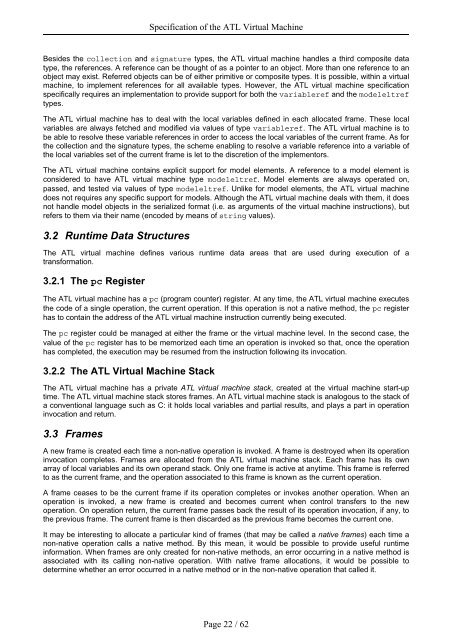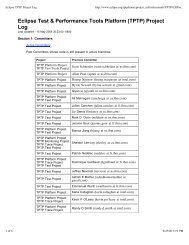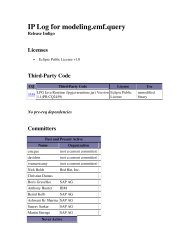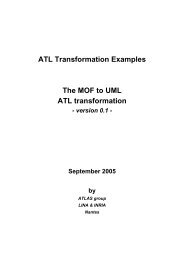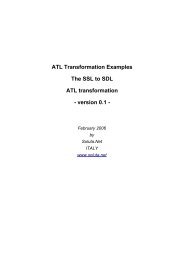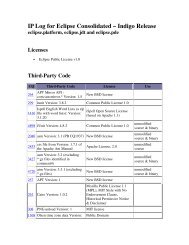ATL: Atlas Transformation Language Specification of the ... - Eclipse
ATL: Atlas Transformation Language Specification of the ... - Eclipse
ATL: Atlas Transformation Language Specification of the ... - Eclipse
You also want an ePaper? Increase the reach of your titles
YUMPU automatically turns print PDFs into web optimized ePapers that Google loves.
<strong>Specification</strong> <strong>of</strong> <strong>the</strong> <strong>ATL</strong> Virtual Machine<br />
Besides <strong>the</strong> collection and signature types, <strong>the</strong> <strong>ATL</strong> virtual machine handles a third composite data<br />
type, <strong>the</strong> references. A reference can be thought <strong>of</strong> as a pointer to an object. More than one reference to an<br />
object may exist. Referred objects can be <strong>of</strong> ei<strong>the</strong>r primitive or composite types. It is possible, within a virtual<br />
machine, to implement references for all available types. However, <strong>the</strong> <strong>ATL</strong> virtual machine specification<br />
specifically requires an implementation to provide support for both <strong>the</strong> variableref and <strong>the</strong> modeleltref<br />
types.<br />
The <strong>ATL</strong> virtual machine has to deal with <strong>the</strong> local variables defined in each allocated frame. These local<br />
variables are always fetched and modified via values <strong>of</strong> type variableref. The <strong>ATL</strong> virtual machine is to<br />
be able to resolve <strong>the</strong>se variable references in order to access <strong>the</strong> local variables <strong>of</strong> <strong>the</strong> current frame. As for<br />
<strong>the</strong> collection and <strong>the</strong> signature types, <strong>the</strong> scheme enabling to resolve a variable reference into a variable <strong>of</strong><br />
<strong>the</strong> local variables set <strong>of</strong> <strong>the</strong> current frame is let to <strong>the</strong> discretion <strong>of</strong> <strong>the</strong> implementors.<br />
The <strong>ATL</strong> virtual machine contains explicit support for model elements. A reference to a model element is<br />
considered to have <strong>ATL</strong> virtual machine type modeleltref. Model elements are always operated on,<br />
passed, and tested via values <strong>of</strong> type modeleltref. Unlike for model elements, <strong>the</strong> <strong>ATL</strong> virtual machine<br />
does not requires any specific support for models. Although <strong>the</strong> <strong>ATL</strong> virtual machine deals with <strong>the</strong>m, it does<br />
not handle model objects in <strong>the</strong> serialized format (i.e. as arguments <strong>of</strong> <strong>the</strong> virtual machine instructions), but<br />
refers to <strong>the</strong>m via <strong>the</strong>ir name (encoded by means <strong>of</strong> string values).<br />
3.2 Runtime Data Structures<br />
The <strong>ATL</strong> virtual machine defines various runtime data areas that are used during execution <strong>of</strong> a<br />
transformation.<br />
3.2.1 The pc Register<br />
The <strong>ATL</strong> virtual machine has a pc (program counter) register. At any time, <strong>the</strong> <strong>ATL</strong> virtual machine executes<br />
<strong>the</strong> code <strong>of</strong> a single operation, <strong>the</strong> current operation. If this operation is not a native method, <strong>the</strong> pc register<br />
has to contain <strong>the</strong> address <strong>of</strong> <strong>the</strong> <strong>ATL</strong> virtual machine instruction currently being executed.<br />
The pc register could be managed at ei<strong>the</strong>r <strong>the</strong> frame or <strong>the</strong> virtual machine level. In <strong>the</strong> second case, <strong>the</strong><br />
value <strong>of</strong> <strong>the</strong> pc register has to be memorized each time an operation is invoked so that, once <strong>the</strong> operation<br />
has completed, <strong>the</strong> execution may be resumed from <strong>the</strong> instruction following its invocation.<br />
3.2.2 The <strong>ATL</strong> Virtual Machine Stack<br />
The <strong>ATL</strong> virtual machine has a private <strong>ATL</strong> virtual machine stack, created at <strong>the</strong> virtual machine start-up<br />
time. The <strong>ATL</strong> virtual machine stack stores frames. An <strong>ATL</strong> virtual machine stack is analogous to <strong>the</strong> stack <strong>of</strong><br />
a conventional language such as C: it holds local variables and partial results, and plays a part in operation<br />
invocation and return.<br />
3.3 Frames<br />
A new frame is created each time a non-native operation is invoked. A frame is destroyed when its operation<br />
invocation completes. Frames are allocated from <strong>the</strong> <strong>ATL</strong> virtual machine stack. Each frame has its own<br />
array <strong>of</strong> local variables and its own operand stack. Only one frame is active at anytime. This frame is referred<br />
to as <strong>the</strong> current frame, and <strong>the</strong> operation associated to this frame is known as <strong>the</strong> current operation.<br />
A frame ceases to be <strong>the</strong> current frame if its operation completes or invokes ano<strong>the</strong>r operation. When an<br />
operation is invoked, a new frame is created and becomes current when control transfers to <strong>the</strong> new<br />
operation. On operation return, <strong>the</strong> current frame passes back <strong>the</strong> result <strong>of</strong> its operation invocation, if any, to<br />
<strong>the</strong> previous frame. The current frame is <strong>the</strong>n discarded as <strong>the</strong> previous frame becomes <strong>the</strong> current one.<br />
It may be interesting to allocate a particular kind <strong>of</strong> frames (that may be called a native frames) each time a<br />
non-native operation calls a native method. By this mean, it would be possible to provide useful runtime<br />
information. When frames are only created for non-native methods, an error occurring in a native method is<br />
associated with its calling non-native operation. With native frame allocations, it would be possible to<br />
determine whe<strong>the</strong>r an error occurred in a native method or in <strong>the</strong> non-native operation that called it.<br />
Page 22 / 62


